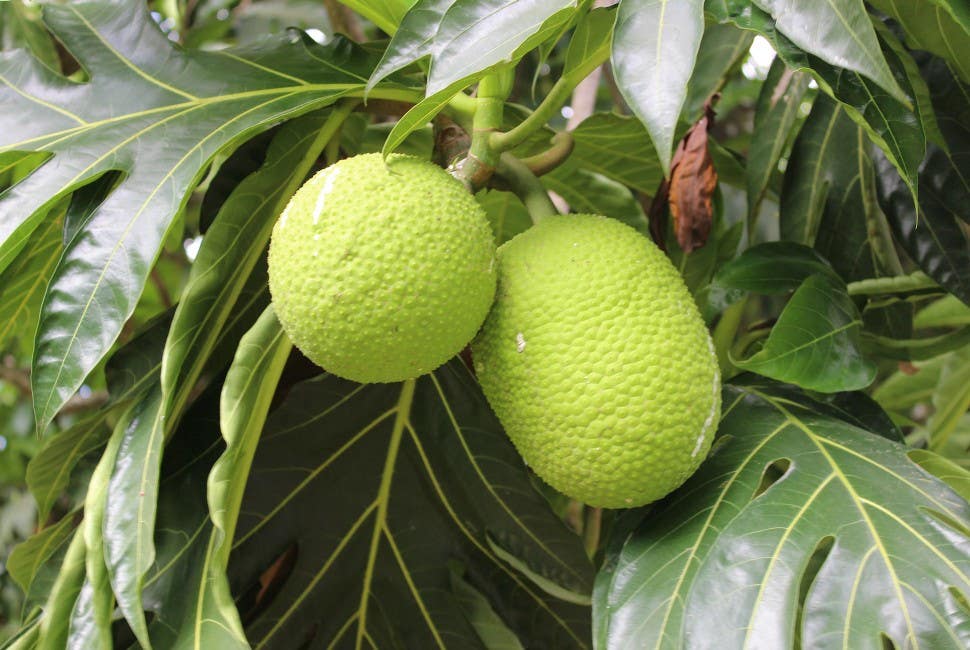Breadfruit may be the key to solving world hunger, study finds
In the midst of escalating concerns surrounding climate change’s impact on global food security, a promising solution emerges – breadfruit

[Jan. 19, 2024: JD Shavit, The Brighter Side of News]
Despite having “fruit” in its name, breadfruit is starchy and seedless, playing a culinary role more like a potato. Closely related to jackfruit, the nutrient-rich food is high in fiber, vitamins and minerals. (CREDIT: Nyree Zerega)
In the midst of escalating concerns surrounding climate change's impact on global food security, a promising solution emerges – the humble breadfruit.
Researchers from Northwestern University have unveiled a groundbreaking study suggesting that breadfruit, a starchy tree fruit native to the Pacific islands, may be the key to mitigating hunger and food scarcity in a changing world.
In a world where the effects of climate change are increasingly evident, many staple crops such as rice, corn, and soybeans are facing a grim future. The recent study has brought to light the resilience of breadfruit, offering hope that this versatile fruit could become a vital source of sustenance in an uncertain world.
Published in the prestigious journal PLOS Climate, this study by Northwestern researchers provides an optimistic outlook for breadfruit as a climate-resilient crop.
Related News
The team believes that breadfruit, owing to its adaptability to changing environmental conditions and suitability for regions plagued by food insecurity, could play a pivotal role in addressing the looming global hunger crisis.
"Breadfruit is a neglected and underutilized species that happens to be relatively resilient in our climate change projections," says Daniel Horton, a senior author of the study and an assistant professor of Earth and planetary sciences at Northwestern's Weinberg College of Arts and Sciences. He further emphasizes the importance of considering breadfruit in food security adaptation strategies, especially given the vulnerability of other staple crops in the face of climate change.
Lucy Yang, the paper's first author and a former student in Horton's laboratory, collaborated with breadfruit expert Nyree Zerega, the director of the Program in Plant Biology and Conservation, a partnership between Northwestern and the Chicago Botanic Garden.
Range of current (1970–2000) breadfruit suitability in the global tropics and subtropics. (CREDIT: PLOS Climate)
While the name might suggest otherwise, breadfruit is not your typical fruit. This starchy, seedless delight plays a culinary role more akin to that of a potato. Closely related to jackfruit, breadfruit boasts a rich nutritional profile, replete with fiber, vitamins, and minerals. For centuries, people in tropical regions have relished breadfruit in various forms, whether steamed, roasted, fried, or fermented. Moreover, it can be transformed into flour, extending its shelf life and making it suitable for export.
Zerega elaborates on the unique attributes of breadfruit, stating, "Breadfruit trees can live for decades and provide a large amount of fruits each year. In some cultures, there is a tradition to plant a breadfruit tree when a child is born to ensure the child will have food for the rest of their life."
However, with tropical regions experiencing increasing temperatures and precipitation, the researchers set out to examine whether climate change would impact breadfruit's growth potential.
The study involved two crucial steps: first, identifying the climate conditions required for breadfruit cultivation, and second, assessing how these conditions are projected to change in the coming decades, specifically between 2060 and 2080. The researchers considered two scenarios for future climate projections – one with high greenhouse-gas emissions and the other with stabilized emissions.
Remarkably, both scenarios indicated that areas suitable for breadfruit cultivation would remain largely unaffected. In tropical and subtropical regions, the suitable area for breadfruit cultivation decreased by only 4.4 to 4.5%.
Moreover, the study revealed the potential for expanding breadfruit cultivation, particularly in sub-Saharan Africa, where breadfruit trees are not traditionally grown but could serve as a crucial and dependable source of sustenance.
Yang explains, "From a climate perspective, we can already grow breadfruit in sub-Saharan Africa. There is a huge swath of Africa where breadfruit can grow to various degrees. It just has not been broadly introduced there yet. And, luckily enough, most varieties of breadfruit are seedless and have little-to-no likelihood of becoming invasive."
Breadfruit's resilience extends beyond its ability to withstand heat and drought compared to other staple crops. As a perennial crop, it requires less energy input, including water and fertilizer, than crops that need annual replanting. Additionally, like other trees, breadfruit aids in sequestering carbon dioxide from the atmosphere over its lifespan.
The implications are profound. Many regions grappling with high levels of food insecurity often resort to importing staple crops like wheat or rice, incurring substantial environmental costs and carbon footprints. With breadfruit, these communities can produce food more locally, promoting sustainability and reducing environmental impact.
In a world grappling with the convergence of climate change, the COVID-19 pandemic, and geopolitical tensions such as Russia's invasion of Ukraine, global food insecurity has reached alarming levels. The Northwestern research team believes that scaling up the production of breadfruit and other overlooked food sources could enhance the resilience of the global food system while enriching the biodiversity of food production.
As Nyree Zerega aptly summarizes, "Climate change further emphasizes the need to diversify agriculture, so the world doesn't rely on a small number of crop species to feed a large number of people. Humans rely heavily on a handful of crops to provide most of our food, but there are thousands of potential food crops among the approximately 400,000 described plant species. This points to the need to diversify agriculture and crops globally."
For more science and technology stories check out our New Discoveries section at The Brighter Side of News.
Note: Materials provided above by The Brighter Side of News. Content may be edited for style and length.
Like these kind of feel good stories? Get the Brighter Side of News' newsletter.



